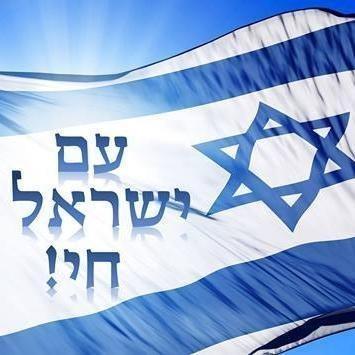April 20, 2018|ה' אייר ה' אלפים תשע"ח Am Yisrael Chai - A Slogan or a Prayer?
Print Article
Upon capturing Yerushalayim fifty years ago, Motta Gur uttered the now iconic words, “Har Ha’bayit b’yadeinu, the Temple Mount is in our hands.” Those who ascend the holiest place on earth, might disagree. Since taking the Old City in 1967, Israeli law has barred Jews from praying on Har HaBayis, or even from bringing a religious item like a siddur, tehillim, or tefillin there.
In September 2015, Itamar Ben Gvir was touring the holy site when a Muslim woman shouted, “Allahu Akbar” at them. He responded by shouting back, “Am Yisrael chai.” After being held for breaking the law, Itamar sued for wrongful detention.
This week an Israeli court ruled in his favor and permitted visitors to the Temple Mount to call out, “Am Yisrael chai” because it is a patriotic slogan, and not a prayer.
It is unclear who first introduced the phrase Am Yisrael Chai. There is a recording of the liberated Jews of Bergen-Belsen concentration camp singing Hatikvah on April 20th 1945. When the anthem ends, there is a brief silence and then a single voice, that of British Army Chaplain Rabbi Leslie Hardman, cries out, “Am Yisroel Chai!”
When Golda Meir visited the Great Synagogue in Moscow as the Israeli Ambassador in 1948 the crowd of 50,000 ecstatically welcomed her with shouts of “Am Yisrael Chai”.
In 1965, Jacob Birnbaum was looking for songs to energize the Soviet Jewry movement. He asked Shlomo Carlebach to compose something, and Shlomo wrote the famous Am Yisrael Chai that climaxes with the pasuk, Od Avinu Chai, our Father is still alive.
In 2009, Prime Minister Netanyahu visited Wannsee Villa in Berlin, where the "Final Solution" for the destruction of Europe's Jews was planned in 1942 by Hitler and leaders of the Third Reich. In the visitors' book he wrote just three words in Hebrew and then translated them into English: “Am Yisrael Chai – The people of Israel live.”
As a slogan, Am Yisrael Chai affirms that despite the systematic attempts to exterminate and annihilate the Jewish people, thanks to Hashem’s guiding hand and our tenacity and resilience, we stubbornly persevere.
While I am happy with the outcome of the Israeli court’s decision, I humbly disagree with its reasoning. Am Yisrael Chai must not remain a patriotic slogan alone. It needs to simultaneously be a prayer, a longing for a united Jewish people living together in safety, security and with unity and harmony.
On the words, “V’lakachti eschem li l’am, I will take you to Me as a people,” (Shemos 6:7), Rabbi Soloveitchik writes:
The political-historical unity as a nation is based on the conclusion of the covenant in Egypt, which occurred even prior to the giving of the Torah at Sinai. This covenant forced upon us all one uniform historical fate. The Hebrew word עם, nation, is identical to the Hebrew word עם, with. Our fate of unity manifests itself through a historical indispensable union…No Jew can renounce his part of the unity…Religious Jews or irreligious Jews, all are included in one nation, which stands lonesome and in misery in a large and often antagonistic world…
In the ashes of the crematoria, the ashes of the chasidim and pious Jews were put together with the ashes of the radicals and the atheists. And we all must fight the enemy, who does not differentiate between those who believe in God and those who reject Him.
This past week we celebrated Yom Ha’atzmaut, marking the miracle of Israel’s independence. While it should be a day that unites us in gratitude and appreciation, unfortunately, for too many it is a day that divides. For some, it is the annual opportunity, both online and offline, to sit in judgement of those who observe it differently or choose not to observe it at all.
Full Hallel, half Hallel, with a bracha, no bracha, no Hallel? Shave, haircut and music or music, no shaving or haircut, or no music or shaving or haircut? Every combination of observance exists and so do the eye rolls, sarcasm and judgment from each camp of those doing it differently.
These are all halachic issues and don’t necessarily reflect a worldview or a lack of recognition of the religious significance of the founding of the State of Israel. Could anyone really believe that because Rabbi Soloveitchik didn’t recite Hallel with a beracha, he wasn’t a great Zionist? Would someone have the audacity to argue that because the Rabbanut endorses Hallel with a bracha, they are less committed to halacha? We must learn to live and pursue our convictions without having to expect them from, or force them on, others.
The secret to a strong Am Yisrael is a sense of Im Yisrael, being in it together, united, loyal, giving one another the benefit of the doubt and judging each other favorably.
Am Yisrael Chai cannot be a slogan alone, it must also a prayer, because we still have a long way to go to fully be an Am, a united family. Rabbi Yisrael Meir Lau, standing in Auschwitz-Birkenau at the March of the Living several years ago said, “We always knew how to die together. The time has come for us to know also how to live together.”
Am Yisrael Chai! May the people of Israel learn to live with one another in harmony and unity!






